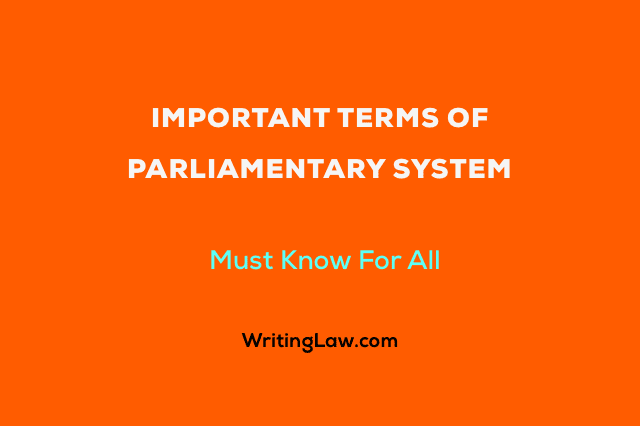
The parliament of India comprises Rajya Sabha, Lok Sabha, and the President. A law student must be well updated with the parliamentary proceedings and certain terms concerning the parliament.
Important Terms of Parliament
Shadow Cabinet
Shadow cabinet means cabinet in waiting. The main opposition party in the parliament forms this notional cabinet. In this cabinet, members are assigned to perform some special functions. Such members lead the opposition in the discussions carried out in parliament.
Care Taker Government
It is the government that comes into existence as soon as the council of ministers resigns or loses confidence in parliament. The government still remains in power until the next council of ministers is formed. It is a constitutional necessity under Article 74 of the Constitution of India.
Interim Government
It is a full-fledged government. It can take any decision in policymaking and other important issues. In India, the interim government came into power with India’s independence from 15 August 1947 till March 1952.
Coalition Government
When no party is able to form a majority government in the Union or in a state, then two or more political parties with common goals and aspirations ally and form a coalition government. For example, in the state of Maharashtra in 2019.
Hung Parliament
In a general election, when no single political party or coalition of parties is able to form a stable or majority government, then such a situation of parliament is called hung parliament.
Lame Duck Session
Lame-duck session refers to a session when the election of new members is done, but they have not held their office yet. It is a session in which the old members participate for the last time because they could not get re-elected. So the last session of old members is termed a lame-duck session.
Dead Lock
When the Houses of parliament, that are Rajya Sabha and Lok Sabha, finally disagree over the passing of a Bill in which they enjoy equal legislative jurisdiction, it is called a deadlock between the two Houses of parliament. In such a situation, the President summons a joint session to remove the deadlock.
Quorum in Parliament
To constitute a meeting of any House of the parliament, one-tenth of the total members of the House must be present to initiate the meeting. If there is no quorum at any time during a meeting, then it shall be the duty of the chairman of Rajya Sabha or speaker of Lok Sabha to adjourn the House or suspend the meeting till the quorum.
Whip
A whip is the floor manager of the parliament and regulates the behaviour and discipline of the members. It is a result of a parliamentary convention. Every political party appoints its own whip. The members who do not obey or follow the orders of the whip are subject to disciplinary action.
Oath
The President or any other member appointed by him administers the oath of office to every member of both Houses. If a member has not yet taken the oath, he cannot take part in the House proceedings. If any member without taking the oath participates in the House proceedings, he will be punished with a fine, which is Rs. 500 per day until he takes the oath.
Plenary Power
This means absolute, unquestioned, and uncontrolled power. With the 24th Constitutional Amendment, the parliament tried to assume the power, but the Supreme Court, under the concept of the basic structure of the Constitution, negated the attempt of the parliament. As per the Supreme Court, all the legislations of the parliament are subject to judicial scrutiny, which is judicial review.
Act
When a Bill presented in either of the Houses gets passed by both the Houses of parliament and further receives the assent of the President, such a Bill becomes an act of the legislature.
Calling Attention
It is a procedure where a member of the House draws the attention of the minister on an urgent issue or a matter of immediate concern. The minister in call of the matter of urgent importance, makes a brief of the statement, and after that, the queries of members are resolved and clarified.
Maiden Speech
It is the first speech or address by the member after he is elected or nominated in the Rajya Sabha.
Unstarred Question
It is a question asked in the House for which an oral answer is not required, but the answer is given in written form on the table.
Expunction
If the chairman of the Rajya Sabha finds the proceedings or records of parliament to be derogatory, indecent, or unparliamentary, then such words, phrases, or derogatory expressions are ordered to be deleted from the records. This is known as expunction.
Question Hour
When the House is called for sitting, the first hour of the parliamentarian session is question hour. It is the time when members can raise questions related to meetings.
Read Next:
- The Withering State of Indian Parliamentary Democracy
- What Are the Powers and Functions of the Indian Parliament
- Important Legal Abbreviations Related to Case Laws
- Article 334A of the Constitution of India - 14th April 2024
- Article 332A of the Constitution of India - 14th April 2024
- Article 330A of the Constitution of India - 14th April 2024







